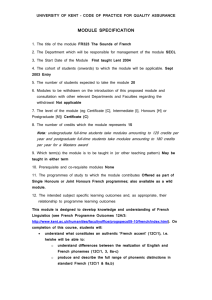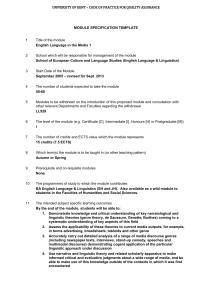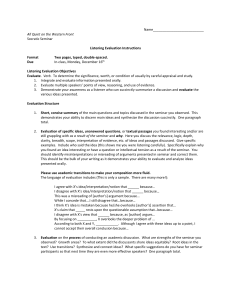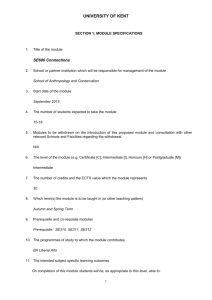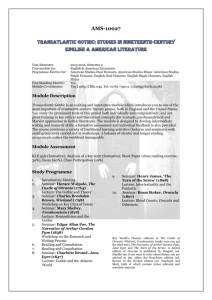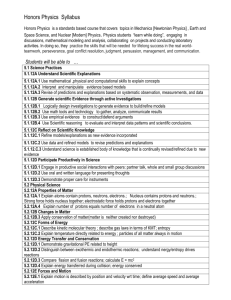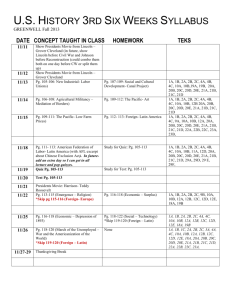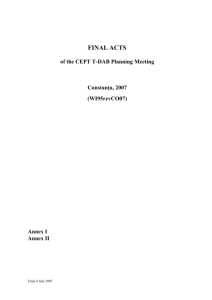module specification
advertisement
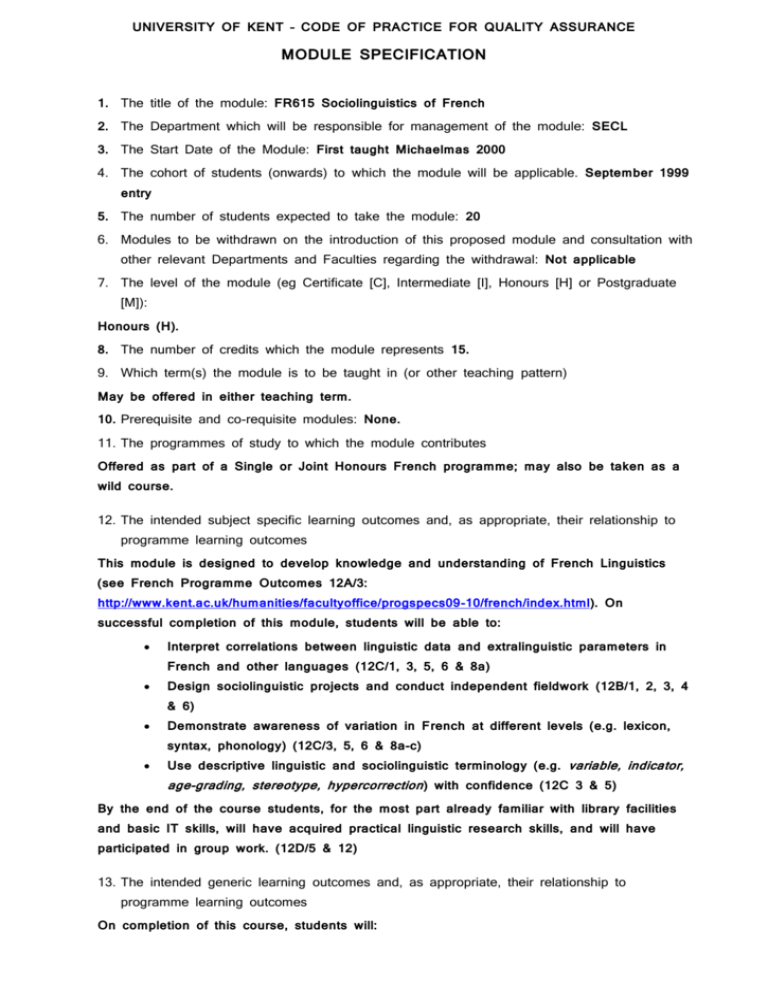
UNIVERSITY OF KENT – CODE OF PRACTICE FOR QUALITY ASSURANCE MODULE SPECIFICATION 1. The title of the module: FR615 Sociolinguistics of French 2. The Department which will be responsible for management of the module: SECL 3. The Start Date of the Module: First taught Michaelmas 2000 4. The cohort of students (onwards) to which the module will be applicable. September 1999 entry 5. The number of students expected to take the module: 20 6. Modules to be withdrawn on the introduction of this proposed module and consultation with other relevant Departments and Faculties regarding the withdrawal: Not applicable 7. The level of the module (eg Certificate [C], Intermediate [I], Honours [H] or Postgraduate [M]): Honours (H). 8. The number of credits which the module represents 15. 9. Which term(s) the module is to be taught in (or other teaching pattern) May be offered in either teaching term. 10. Prerequisite and co-requisite modules: None. 11. The programmes of study to which the module contributes Offered as part of a Single or Joint Honours French programme; may also be taken as a wild course. 12. The intended subject specific learning outcomes and, as appropriate, their relationship to programme learning outcomes This module is designed to develop knowledge and understanding of French Linguistics (see French Programme Outcomes 12A/3: http://www.kent.ac.uk/humanities/facultyoffice/progspecs09-10/french/index.html). On successful completion of this module, students will be able to: Interpret correlations between linguistic data and extralinguistic parameters in French and other languages (12C/1, 3, 5, 6 & 8a) Design sociolinguistic projects and conduct independent fieldwork (12B/1, 2, 3, 4 & 6) Demonstrate awareness of variation in French at different levels (e.g. lexicon, syntax, phonology) (12C/3, 5, 6 & 8a-c) Use descriptive linguistic and sociolinguistic terminology (e.g. variable, indicator, age-grading, stereotype, hypercorrection) with confidence (12C 3 & 5) By the end of the course students, for the most part already familiar with library facilities and basic IT skills, will have acquired practical linguistic research skills, and will have participated in group work. (12D/5 & 12) 13. The intended generic learning outcomes and, as appropriate, their relationship to programme learning outcomes On completion of this course, students will: UNIVERSITY OF KENT – CODE OF PRACTICE FOR QUALITY ASSURANCE (a) be able to initiate and participate in group discussion of issues raised (12B/1-7; 12D/1 & 3) (b) be able to lead seminars by participating in assessed group presentations (12B/1-7; 12D/1, 9, 10 & 11) (c) be able to write cogent, well-constructed essays supported by evidence (from texts, speech, native-speaker intuitions, and linguistic commentators) (12B/1-7; 12D/1, 3, 4, 5, 6, 7, 8 & 12) Students will have become familiar with library facilities and will be able to work with them independently. The University provides support through the Study Centre or library information packs, for example (12D/4 & 5). 14. A synopsis of the curriculum 1 2 3 4 5 6 7 8 9 10 11 12 ariation in French Phonology: The Martinet (1945) Study Urban Variation models Social variation in French Variation and change? the case of ne Reading Week Analysing the French Lexicon The Pragmatics of French Discourse Français régional: an emergent norm? Reading Week Language Activism Language and Sex: Féminisation des noms de métier Sur table test/Examination revision 15. Indicative Reading List A full bibliography is included in the module handbook and online at the Templeman Library website; specific readings for each topic are indicated in the module programme. There is no ‘course book’ as such, but students may find it helpful to purchase one of the following: Armstrong, N. (2001) Social and Stylistic Variation in Spoken French: A Comparative Approach. Amsterdam: John Benjamins. Ball, R. (1997) The French-Speaking World: a practical introduction to sociolinguistic issues. Routledge. Walter, H. (1994) French Inside and Out. London: Routledge. (b) The following also provide useful background material: Battye, A. & Hintze, M-A & Rowlett, P. (2000). The French Language Today. London: Routledge. Wardhaugh, R. (1998) An Introduction to Sociolinguistics. Blackwell. Students are strongly recommended to purchase: 16. Learning and Teaching Methods, including the nature and number of contact hours and the total study hours which will be expected of students, and how these relate to achievement of the intended learning outcomes UNIVERSITY OF KENT – CODE OF PRACTICE FOR QUALITY ASSURANCE There are 10 seminars of 2 hours each; a student would normally be expected to do an additonal average 8 weekly hours private study (see French Programme Outcomes 12D/7 & 8). After week 1, sessions will divide into a student-led seminar (12D/1, 3, 7, 8, 9 & 10) and lecture of roughly equal length. The student-led seminar will consist of a 15- minute presentation relating to the relevant seminar topic, followed by questioning and general discussion (12B/3-6). The lecture by the seminar leader will reinforce key points relating to the seminar topic and introduce the following topic as appropriate. There are two reading weeks, Weeks 5/17 and 9/21, in which no seminar is scheduled. Individual consultation will be available for essays and presentations. Total study hours = 150. 17. Assessment methods and how these relate to testing achievement of the intended learning outcomes When offered in Period 1 (Autumn), assessment is based entirely on coursework, broken down as follows: 20% seminar presentation 50% essay (max 2,500 words) 30% sur table test (2 hours) The essay will relate to the topics covered in Weeks 1-6 of the course. The mark for the seminar presentation will be awarded for a group presentation during the term. In the event of a group or individual being asked to perform more than one presentation, the higher of the two marks awarded will count. A bonus mark may be added to the seminar presentation mark of individual students whose contribution throughout the term (e.g. in leading questioning after presentations) is exceptional. Finally, for the two-hour test in week 12, students will be required to answer two questions, one (from 3) relating to the second half of the course and another (from 3) relating to general themes raised by the course. The assessment pattern in Period 2 (Spring) is as follows: 10% seminar presentation 30% essay (2,500 words max.) 60% examination (2 hours; 2 from 6 or 7 questions) For the two-hour examination, candidates must choose 2 from 6 or 7 questions relating to specific topics or general themes covered in the course. 18. Implications for learning resources, including staff, library, IT and space No additional specific resource requirements. 19. A statement confirming that, as far as can be reasonably anticipated, the curriculum, learning and teaching methods and forms of assessment do not present any non-justifiable disadvantage to students with disabilities As far as can reasonably be anticipated the module will not present any non-justifiable disadvantage to students with disabilities. If any student requires wheelchair access, an appropriate teaching room will be obtained. Students who are visually-impaired or hearingimpaired will have appropriate specific provision made for them, such as the provision of material in Braille or a signer. UNIVERSITY OF KENT – CODE OF PRACTICE FOR QUALITY ASSURANCE
